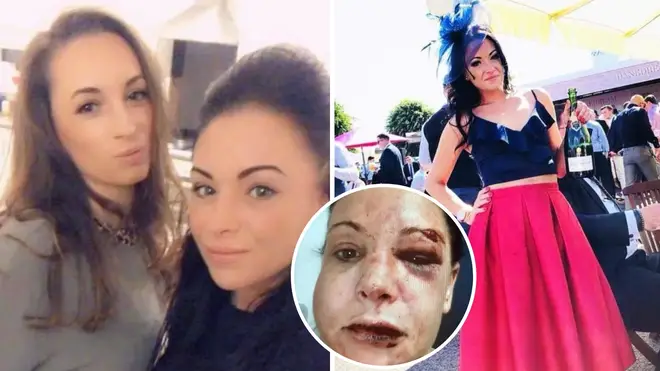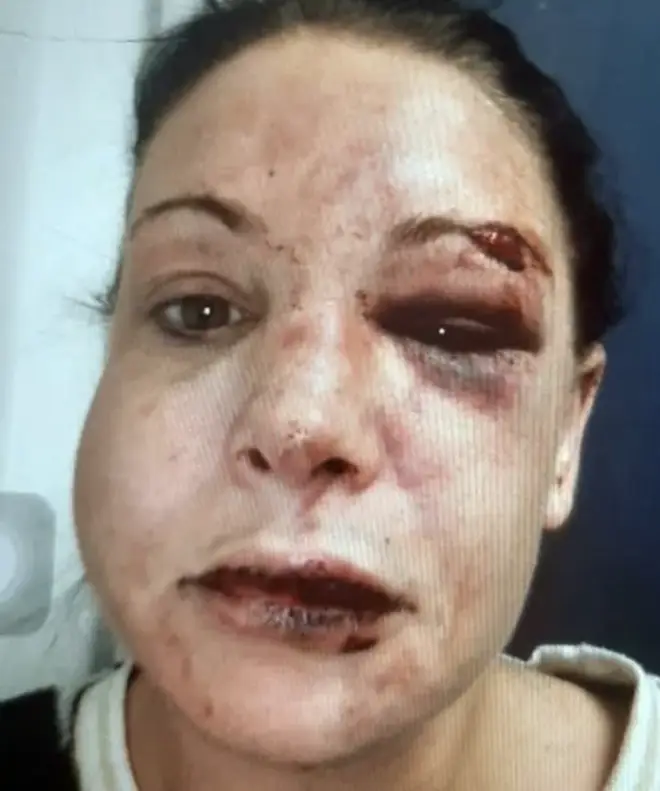
Tom Swarbrick 4pm - 6pm
4 September 2023, 07:25 | Updated: 4 September 2023, 17:35

The policing lead for domestic abuse has told LBC she wants more perpetrators to be charged with manslaughter if their victim takes their own life, as bereaved families call for a change in the law to prevent abusers "escaping justice".
It's feared hundreds of abusers have walked free, with at least 114 victims of abuse and coercive control known to have died by suicide between March 2020 and April 2022.
Campaigners say "insubstantial, inadequate" police investigations will have led to perpetrators with a "strong hand" in their deaths escaping the criminal justice system.

Calls for manslaughter charges as domestic abusers 'escape justice'
Kirsty Robinson, whose sister Gemma took her own life whilst her former partner was awaiting trial for GBH with intent, is calling for the link to be recognised in law to ensure more thorough investigations lead to tougher charges for offenders.
Gemma Robinson took her own life in 2020 after being left "terrified" to face her abusive ex in court, eight months after he savagely attacked her in her home.
Because she was no longer alive to support the prosecution, the Crown Prosecution Service were forced to drop the charge of GBH with intent, which carries a maximum life sentence, to the lesser offence of GBH.

The maximum sentence for the offence is five years, and Joseph Falconer received three and a half years in prison. He has since been released. Kirsty told LBC it was "inconceivable" that Falconer was prosecuted for a lesser offence following her death, and said "if she hadn't have experienced what she had gone through, if she had never have met him, she would still be here - 100%."
Frank Mullane, chief executive of the charity Advocacy After Fatal Domestic Abuse, told LBC: "Insubstantial and inadequate investigations in to the history of domestic abuse must mean that persons who had a strong hand in [victims suicides] have not been apprehended by the criminal justice system.
"Police need to make their investigations more substantial, and there needs to be more senior police oversight of that investigation.
If there is a homicide, police throw resources at it.

We should be bringing some of that intensity and resource to suicides and make sure we are checking criminality - which at the moment is going by without being checked."
It's widely expected the true number of suicides following domestic abuse will be much higher, and potentially greater than the number of domestic homicides, because of a lack of understanding of the link between them.
Assistant Commissioner Louisa Rolfe, who is the National Police Chiefs' Council lead for Domestic Abuse, told LBC she is "very sorry" if officers have missed opportunities to pursue stronger charges against offenders in the past, and would like to see more manslaughter cases brought forward if a victim is found to have taken their own life as a result of domestic abuse.
She said officers are now working to better identify when it may have been a factor in order to pursue the cases, as she admitted families have told her of their "utter frustration that justice hasn't been done".
But AC Louisa Rolfe said "it can be really difficult to prove" when abuse has been a factor in a suicide, and that more prosecutions will rely on improvements in police investigations.
She said: "If we're seeing as many victims taking their own lives as a result of domestic abuse as we are seeing who are sadly murdered through domestic homicide, there is certainly scope for more prosecutions. But we need to be collecting evidence as soon as we possibly can, we need to be supporting officers to look for that evidence at the scene, and we need to be working with the Crown Prosecution Service."
The Independent Domestic Abuse Commissioner, Nicole Jacobs, told LBC a change in legislation could be required to recognise the link between domestic abuse and suicide, which would improve investigations and ensure secure stronger charges against offenders.
Nicole Jacobs said there could be a benefit to "examining the law and deciding what more we can do to improve clarity of how the law is applied, and potentially changes in the law, to bring more accountability for the perpetrators actions for that suicide, leading up to that suicide."
She said changes would prevent abusers from harming anyone else, because "they do not stop at one victim."
Ms Jacobs told LBC: "They move from victim to victim, and the nature of the way they conduct relationships is power and control. They take that mindset to the next person they're involved with. "We have to think about the justice for the current victim, and the prevention of harm for future victims. If the coroner is able to have access to the right information, they can make those judgements more clearly, but right now so much information is unclear, leading to less clear outcomes and judgements.
"There are really clear points that need to be improved - what is the background? Who is there at the scene? What are they linking with family members, and how can family members feed in and eventually move towards a coroner process - to make those links and decisions about whether this suicide is due to a background of domestic abuse, or in some way linked?"
There is one known case in the UK where an offender has been prosecuted for manslaughter following their victims' suicide.
Nicholas Allen was jailed for 10 years for the manslaughter of Justene Reece, from Stafford, who killed herself in 2017 as a "direct result" of his behaviour.
In June 2022, a coroner investigating the death of another victim, Jessie Laverack, wrote to the Home Secretary urging the government to act on the link between domestic abuse and suicide, after ruling the domestic violence she suffered was the "primary cause" of her illness.
And in a "ground-breaking ruling" in July, a coroner overturned a ruling of suicide in the case of Kellie Sutton, and recorded her death as an "unlawful killing".
Ms Sutton's former partner Stephen Gane was present at the inquest, after serving four years and three months in prison for controlling and coercive behaviour, assault occasioning actual bodily harm and assault by beating.
Kirsty Robinson told LBC she can't get the justice she "really wants" for her sister Gemma, because her abuser is now "out of prison, able to live a normal life, and talk to other women who are probably not aware of what he has done to my sister."
But she said she would like to see a change in the law in the name of Gemma and other victims "where they will see and recognise the link between domestic abuse and suicide, because it is has happening far too much and not being recognised at all."
In response to Joseph Falconer being prosecuted for a lesser offence following Gemma Robinson's death, a CPS spokesperson said: “We accepted a guilty plea to inflicting grievous bodily harm following careful consideration of our legal guidance and whether there was a realistic prospect of conviction on a charge of grievous bodily harm with intent.
“Our thoughts remain with Gemma’s family following her death.”
The former justice secretary, Robert Buckland, told LBC: "The fact a victim has taken their own life shouldn't mask the commission of many potential criminal offences by the perpetrator - whether it's harassment, assault or the actions that led up to the death of that abused person.
"That's why I think we need to look very carefully at this and indeed look at the law as well to make sure it's reflecting the reality.
"Inevitably the police and other authorities will be guided by the legal framework within which they operate.
"The change to the law I spearheaded on coercive control, I believe, led to quite a change in culture amongst investigating authorities to look at the wider context within which an abused person was living their lives.
"The same can be said for this tragic and unacceptable aspect of the consequences of domestic abuse.
"It's no good just to look at the individual and immediate causes of their death, it's very important we understand the wider context that sometimes drove and drives people to the most extreme act which is taking one's own life.
"This is an area that needs urgent examination and we need to redouble our efforts to make sure those who are ultimately responsible for such a tragic set of circumstances do not get away with it."
A government spokesperson said: "We are committed to preventing more tragedies related to domestic abuse. This includes reforming the Domestic Homicide Review process to strengthen guidance for suicide cases and funding the Domestic Homicide and Suspected Victim Suicides Project, which produces research and analysis of trends in suicides linked to domestic abuse.
"We are committed to updating police guidance on suicide to explicitly include references to domestic abuse and for the police to consider if domestic abuse was a contributing factor in cases of unexplained deaths and suspected suicides."
Those feeling distressed or suicidal can call Samaritans for help on 116 123 or email jo@samaritans.org in the UK.